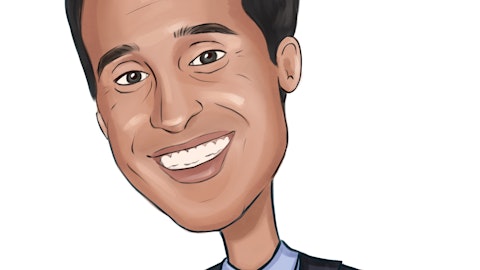3. Bank of America Corporation (NYSE:BAC)
Sculptor Capital’s Stake Value: $398,218,000
Percentage of Sculptor Capital’s 13F Portfolio: 3.28%
Number of Hedge Fund Holders: 72
Bank of America Corporation (NYSE:BAC) is an American financial services corporation offering expertise in asset management, investment banking, commodities trading, equities trading, insurance and mortgage, risk management, and wealth management. Sculptor Capital holds a $398.2 million position in Bank of America Corporation (NYSE:BAC), which represents 3.28% of his Q3 portfolio.
Bank of America Corporation (NYSE:BAC) posted its Q3 results on October 14. EPS in the quarter totaled $0.85, beating estimates by $0.15. Revenue for the period amounted to $22.77 billion, up 11.33% from the prior-year quarter, topping estimates by $1.16 billion.
On November 23, Piper Sandler analyst Jeffery Harte raised the price target on Bank of America Corporation (NYSE:BAC) to $53 from $50 and kept an Overweight rating on the shares, citing the room for growth and upward revaluation exhibited by the latest expansions by the company.
One of the leading Bank of America Corporation (NYSE:BAC) stakeholders is Harris Associates, holding 59.4 million shares valued at $2.52 billion. Overall, as of September, 72 hedge funds were bullish on Bank of America Corporation (NYSE:BAC), down from 87 in the prior quarter.
Here is what Oakmark Funds has to say about Bank of America Corporation (NYSE:BAC) in its Q3 2021 investor letter:
“Earlier this year, one of our holdings, Bank of America, announced that it was raising its minimum hourly wage from $15 to $20 and would increase it to $25 by 2025. The company received great press for placing the well-being of its employees above profits. But was it really either/or? Bank of America’s chief human resources officer spoke to the bigger picture: “A core tenet of responsible growth is our commitment to being a great place to work…that includes providing strong pay and competitive benefits to help them and their families, so that we continue to attract and retain the best talent.” Bank of America understood that engaged, high-caliber employees are more productive, less prone to turnover and, therefore, less expensive in the long run. Increasing the pay for employees wasn’t elevating employees above shareholders; it was the right thing to do for employees and for shareholders.
If an increase to $20 was good, why stop there? Why not $50 per hour? Because the benefits the business receives at $50 don’t justify the expense. The bank would no longer be able to price its products competitively and would lose business. The employees would “win” in the short term, but eventually the lost business would lead to job cuts, meaning both employees and shareholders would lose. The negative effects of stakeholder overreach are no different than when CEOs overreach to inflate short-term profits. Both hurt shareholders and stakeholders.”





